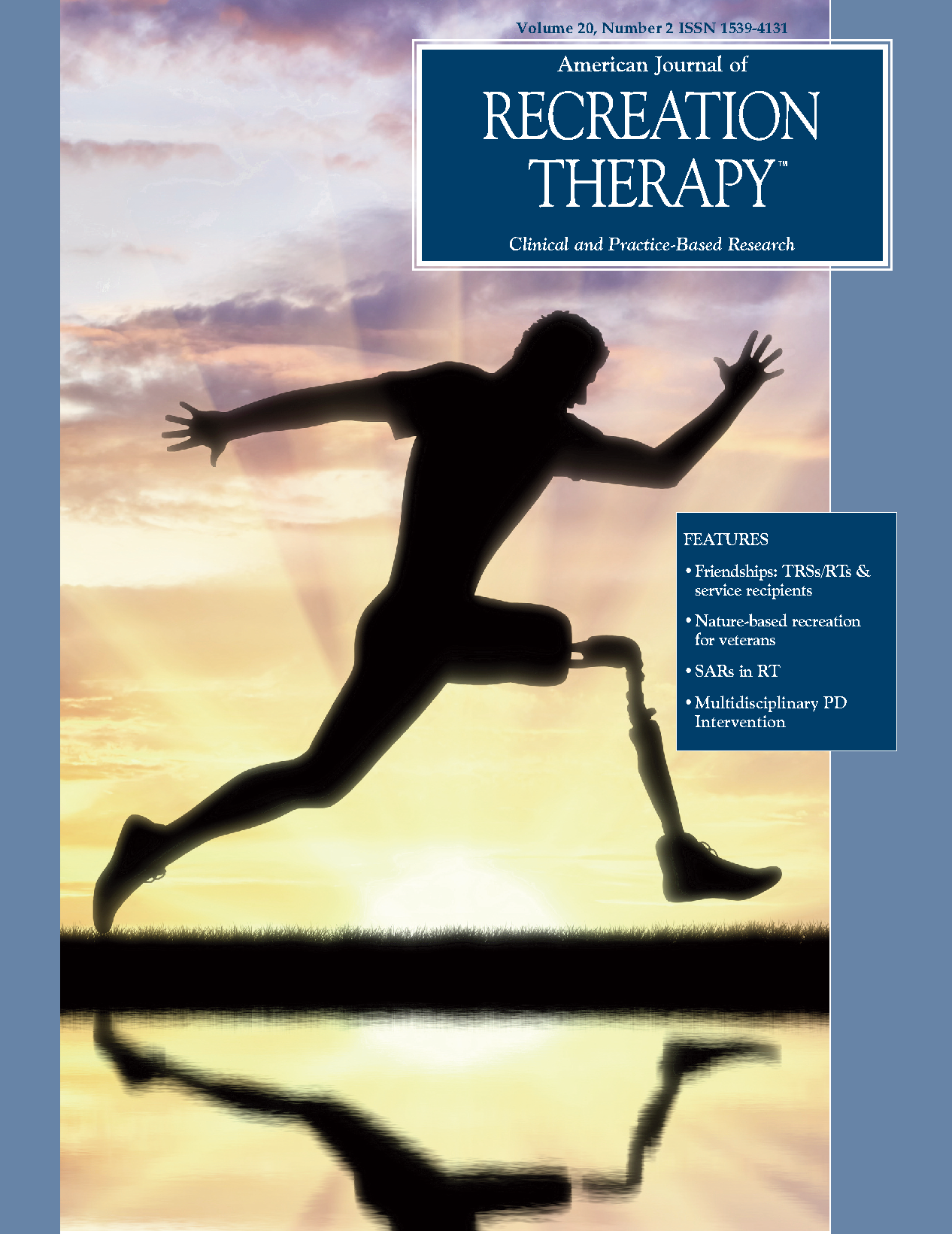Friendships between therapeutic recreation specialists/recreational therapists and service recipients
DOI:
https://doi.org/10.5055/ajrt.2021.0232Keywords:
friendship, humanistic perspective, therapeutic recreation/recreational therapy, virtuesAbstract
Sylvester concluded a virtue-based conceptualization of therapeutic recreation/recreational therapy (TR/RT) by identifying moral habits deemed crucial to excelling as professionals. One of the virtues is forming friendships with people receiving TR/RT services. Though intriguing, Sylvester’s conclusion has not garnered much interest from TR/RT scholars so the purpose of this paper is to generate greater awareness of and engagement with the topic. The goal is achieved by connecting the topic to a theoretical framework utilized in the profession, reviewing a historical discourse on friendship, and supplementing that account with contemporary findings. This paper concludes by listing some potential benefits of and impediments to developing friendships, and briefly discussing how professionals can foster friendly, therapeutic environments when friendships are inappropriate or impossible to form.
References
Sylvester C: A virtue-based approach to therapeutic recreation practice. Ther Recreation J. 2009; 43(3): 9-25. 2. Devine M, Piatt J, Dawson S: The role of a disability-specific camp in promoting social acceptance and quality of life for youth with hearing impairments. Ther ecreation J. 2015; 49(4): 293-309.
Schleien SJ, Ray MT, Green FP: Community Recreation and People with Disabilities: Strategies for Inclusion. 2nd ed. Baltimore, Maryland: P.H. Brookes; 1997.
Stumbo NJ, Wilder A, Zahl M, et al.: Community integration: Showcasing the evidence for therapeutic recreation services. Ther Recreation J. 2015; 49(1): 35-60.
Aristotle: Nicomachean ethics. Ross WD, Trans. In: McKeon R, ed. The Basic Works of Aristotle. New York: The Modern Library; 2001: 928-1112.
Mitias MH: Friendship: A Central Moral Value. New York: Rodopi; 2012.
Badhwar NK, ed.: Friendship: A Philosophical Reader. Ithaca, New York: Cornell; 1993.
Austin DR: Reformulation of the health protection/health promotion model. Am J Recreat Ther. 2011; 10(3): 19-26.
Hallam R: The Therapy Relationship: A Special Kind of Friendship. London, UK: Karnac; 2015.
Rogers CR: Client-Centered Therapy: Its Current Practice, Implications, and Theory. Boston, Massachusetts: Houghton Mifflin; 1951.
Rogers CR: On Becoming a Person: A Therapist’s View of Psychotherapy. New York: Houghton Mifflin; 1995.
Maslow AH: A theory of human motivation. Psychol Rev. 1943; 50: 370-396.
Austin DR: Therapeutic Recreation Processes and Techniques: Evidence-Based Recreational Therapy. 7th ed. Urbana, Illinois: Sagamore; 2013.
Austin DR: Lessons Learned: An Open Letter to Recreational Therapy Students and Practitioners. Urbana, Illinois: Sagamore; 2011.
Austin DR: Integrating behavioral activation with humanistic psychology and positive psychology: Applications within the health protection/health promotion model. Am J Recreat Ther. 2019; 18(1): 9-18.
Wise JB: What is leisure? A MacInytrian based response. J Unconventional Park, Tour Recreat Res. 2014; 5(2): 17-22.
Wise JB: A conceptualization of recreation that contributes to human flourishing. Ther Recreation J. 2019; 53(1): 37-52.
Baumeister RF, Leary MR: The need to belong: Desire for interpersonal attachments as a fundamental human motivation. Psychol Bull. 1995; 117(3): 497-529.
Mooney TB, Williams JN: Valuable asymmetrical friendships. Philosphy. 2017; 92: 51-76.
Toon PD: A Flourishing Practice? London, UK: Royal College of General Practitioners; 2014.
Albury WR, Weisz GM: The medical ethics of Erasmus and the physician-patient relationship. Med Humanit. 2001; 27: 35-41.
MacIntyre A: Dependent Rational Animals: Why Human Beings Need the Virtues. Chicago, Illinois: Open Court; 1999.
Sandhu S, Arcidiacono E, Aguglia E, et al.: Reciprocity in therapeutic relationships: a conceptual review. Int J Ment Health Nurs. 2015; 24: 460-470.
Rogers CR: The necessary and sufficient conditions of therapeutic personality change. J Consult Clin Psychol. 1992; 60: 827-832 (Original work published in 1957).
Rawlins WK: Teaching as a mode of friendship. Commun Theory. 2000; 10: 5-26.
Rawlins WK: Narrative medicine and the stories of friends. J Appl Commun Res. 2009; 37: 167-173.
Marino MG: Therapeutic reciprocity: a concept synthesis. Int J Hum Caring. 2017; 21: 91-94.
Nausner B: The medical encounter as communion: medical humanities, health care and the trinity. Pract Theol. 2011; 4: 181-199. DOI: 10.1558/ prth.v4i2.181
Ryan RM, Deci EL: Self-determination theory and the facilitation of intrinsic motivation, social development, and well-being. Am Psychol. 2000; 55: 68-78.
Carter MJ, Van Andel GE: Therapeutic Recreation: A Practical Approach. 5th ed. Long Grove, Illinois: Waveland; 2020.
American Therapeutic Recreation Association: Code of ethics. American Therapeutic Recreation Association website. Available at https://www.atra-online.com/page/Ethics. Accessed June 23, 2020.
Cushing P, Lewis T: Negotiating mutuality and agency in care-giving relationships with women with intellectual disabilities. Hypatia. 2002; 17: 173-193.
Hem MH, Pettersen T: Mature care and nursing in psychiatry: notions regarding reciprocity in asymmetrical professional relationships. Health Care Anal. 2011; 19: 65-76.
Loewy EH: Physicians, friendship and moral strangers: an examination of a relationship. Camb Q Healthc Ethics. 1994; 3: 52-59.
Mobily KE, Dieser RF: Seeking alternatives in therapeutic recreation/recreation therapy: a social/recreation community model. Leisure. 2018; 42: 1-23. https://doi.org/10.1080/14927713.2017.1403860
Published
How to Cite
Issue
Section
License
Copyright 2000-2025, Weston Medical Publishing, LLC and American Journal of Recreation Therapy. All Rights Reserved.


